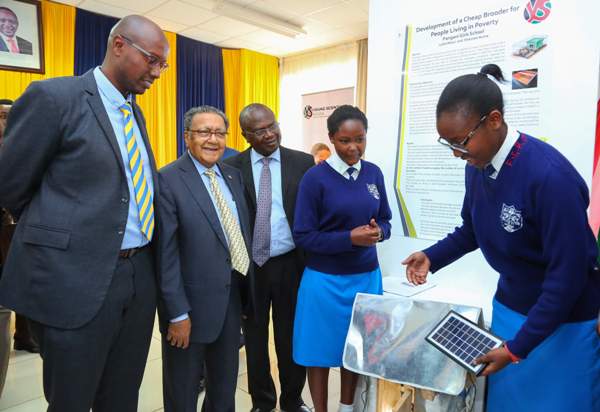
Science, Technology, Engineering and Mathematics (STEM) studies and careers are becoming increasingly important in order to prepare students to develop innovative solutions to solve challenges in diverse sectors.
General Electric (GE) and Young Scientists Kenya hosted a workshop to sensitize male and female secondary school students on the benefits of taking up STEM careers, not just for themselves, but also for the development of the society as a whole.
“STEM is important today with technology and innovation continuously expanding into every aspect of our lives. At GE, we find it vital to expose students to our facilities and teams working in STEM related roles across our Healthcare, Power and Aviation businesses. This gives them an opportunity to develop a passion for innovation whether in employment or entrepreneurship,” said Brenda Mbathi, Director, Government Affairs & Policy and GE Women’s Network Leader for East Africa.
According to statistics from the Bureau of Labour, 58% of all new jobs in Science, Technology, Engineering and Math (STEM) are in computing. Yet in Africa, less than 2% of students, under 18, finish school with vital STEM skills.
The gap is even greater among underserved and underrepresented communities more so among young girls. According to UNESCO, only 28 percent of women globally are currently working in science and technology related fields. In Kenya, only 9% of Kenyan women are registered engineers.
Through the platform created by Young Scientists of Kenya (YSK), students from across the country are encouraged to explore careers in STEM. In 2018, YSK’s inaugural National Science and Technology Exhibition took place, from which 22 projects providing solutions in energy, infrastructure, agriculture, social issues, and more were selected.
These projects are potential small micro enterprises that could grow to large-scale industries to provide employment to young people in the country.
“Partnerships are critical in promoting STEM initiatives among young people. As we continue to develop STEM communities of practice through partnerships with the Government, academia and private sector, we hope to see more STEM related subjects entrenched in institutions of learning across the country,” said Michael Waiyaki, Acting National Programmes & Partnerships Director, Young Scientists of Kenya.
The workshop consisted of a tour of the GE Healthcare Training Institute, a panel discussion with GE senior business leaders where they shared career advice as well as one-on-one mentorship sessions for the students.
As part of its ongoing commitment to increase gender representation in technical programs, General Electric launched GE Girls initiative, designed to encourage girls to explore the world of science, technology, engineering and math (STEM), and STEM-based careers. In Kenya GE has had initiatives with Starehe Girls, SHOFCO, Kabuku, Kinoo, Safe Spaces, Young Scientists Kenya, among other institutions to date.
About GE : GE is the world’s Digital Industrial Company, transforming industry with software-defined machines and solutions that are connected, responsive and predictive. GE is organized around a global exchange of knowledge, the “GE Store,” through which each business shares and accesses the same technology, markets, structure and intellect. Each invention further fuels innovation and application across our industrial sectors. With people, services, technology and scale, GE delivers better outcomes for customers by speaking the language of industry.
About YSK: Young Scientists Kenya (YSK) is a unique platform in East Africa aimed at encouraging secondary school students to demonstrate their innovation and showcase their scientific talents and STEM pathways. It is based on the premise that a wealth of talent and potential for innovation exists in Kenya. Modeled on the internationally acclaimed British Telecom Young Scientists and Technology Exhibition (BTYSTE) in Ireland and local science fairs such as Kenya Science and Engineering Fair, Young Scientists Kenya will help to popularize science and technology amongst young people and encourage them to develop projects that seek practical solutions to the everyday problems we face within society. (End)
